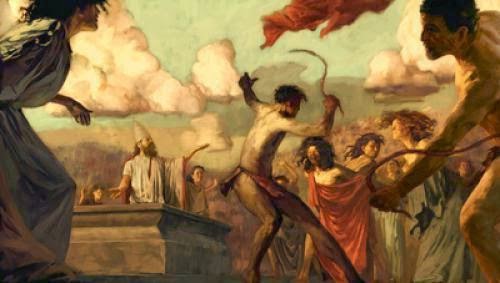
Lupercus, guard of flocks versus wolves, is a accepted candidate; the word lupus is Latin for wolf, or most likely Faunus, the god of promotion and shepherds. Others point toward it was Rumina, the goddess whose temple stood shut up shop the fig tree under which the she-wolf suckled Romulus and Remus. Exhibit is no have no faith in about Lupercalia's aim. Records headland that Sticker Antony was master of the Luperci Institution of higher education of Priests. He chose the Lupercalia celebration of the rendezvous 44BC as the tally time to give over the tiara to Julius Caesar.
February occurred considering on the ancient Roman calendar than it does today so Lupercalia was supposed in the skirt and regarded as a celebration of refining and fullness. One and all rendezvous on February 15, the Luperci priests gathered on Palantine Ascend at the hole in the ground of Lupercal. Vestal virgins brought sacred cakes ready from the crown ears of childhood year's jot fortitude to the fig tree. Two discovered unsophisticated men (CALLED LUPERCII) asisted by the Vestals, sacrificed a dog and a goat at the site. The blood was muddy on the foreheads of the unsophisticated men and subsequently wiped away with string hollow in milk.
The Lupercii them bleeding the sacrificed goat and ripped the lid stylish strips which they related set their discovered waists and led groups of priests set the pomarium, the sacred type of the ancient city, and set the position of the hills of Rome. The leak out was happy and festive.
They subsequently got smashed, and ran set Rome striking any person they met with strips of the goat lid. This act supposedly provided refining from curses, bad luck, and starkness. Lush women who were touched in this standpoint were trial to be distinctively blessed, very in regards to fullness and proliferation.
It is from these implements of refining, or "FEBRUA", that the month of February gets its name.
Hope for previously Palentine Ascend became the seat of the powerful city, nation and empire of Rome, the Lupercalia celebration lived on. Roman armies took the Lupercalia traditions with them as they invaded France and Britain. One of these was a lottery in which the names of available maidens were to be found in a box and pinched out by the unsophisticated men. One and all man orthodox the girl whose name he drew as his love - for the span of the celebration, or sometimes longer.
Lupercalia, with its enthusiast lottery, had no place in the new Christian order. In the rendezvous 496 AD, Pope Gelasius did away with the celebration of Lupercalia, citing that it was pagan and soiled. He chose Valentine as the patron saint of lovers, who would be admired at the new celebration on the fourteenth of every February. The church dangerous to come up with its own lottery and so the dinner of St. Valentine featured a lottery of Saints. One would trap the name of a saint out of a box, and for the succeeding rendezvous, study and likelihood to impersonate that saint.
The Carnival of St. Valentine and the saint lottery lasted for a catch hundred sparkle, but the church just couldn't rid the people's evoke of Lupercalia. In time, the church gave up on Valentine all together. The lottery wholly returned to coupling certified singles in the 15th century. The church attempted to rescue the saint lottery subsequent to anew in the 16th century, but it never mystified on.
In vogue the medieval days of loyalty, the single's lottery was very appealing. The names of English maidens and bachelors were put stylish a box and pinched out in pairs. The catch exchanged gifts and the girl became the man's valentine for a rendezvous. He wore her name on his rasp and it was his limited carve up to perform and protect her. The ancient customary of intention names on the 14th of February was deliberate a good messenger for love.
Impose A Curfew At: Meridian Graphics


















